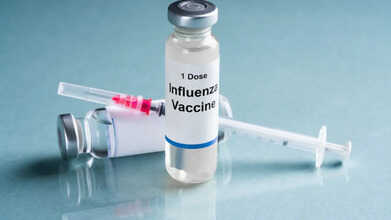- Health Conditions A-Z
- Health & Wellness
- Nutrition
- Fitness
- Health News
- Ayurveda
- Videos
- Medicine A-Z
- Parenting
- Web Stories
World Immunization Day 2025: Significance, Origin, Theme And Importance

Credits: Canva
Every year on November 10, World Immunization Day is observed. This day aims at highlighting the lifesaving power of vaccines and the role they play in preventing infectious diseases. Vaccines also act as protective shield, thus awareness around vaccines becomes more important on this very day. The World Health Organization (WHO) has also formalized this day as an annual observance to promote sustained global participation in disease prevention.
The date, November 10, aligns with the anniversary of the EPI, which began in 1974 with a mission to ensure that every child, regardless of geography or income, has access to lifesaving vaccines. This program built the foundation for today’s vast immunization network.
The practice of immunization itself dates back to the late 18th century, when Edward Jenner’s pioneering smallpox vaccine laid the groundwork for modern preventive medicine. Over time, vaccines have played a crucial role in controlling diseases such as diphtheria, tetanus, measles, and more recently, novel viruses like COVID-19.
Theme: “Immunization for All is Humanly Possible” is the theme this year.
Why Are Vaccines Important?
Vaccines remain among the most efficient medical tools available. They protect individuals from deadly infections including measles, polio, tetanus, and other vaccine-preventable diseases.
Beyond individual protection, vaccines help create herd immunity. When a majority of people in a community are vaccinated, it becomes harder for infections to spread. This collective barrier protects vulnerable groups, including infants, the elderly, and those with weakened immune systems.
According to WHO, vaccines save millions of lives every year and are one of the most cost-effective ways to improve health. By preventing illness before it occurs, vaccines reduce the need for medical treatment, hospitalization, and long-term care, leading to healthier societies and less economic burden.
WHO also plays an important role in guiding countries on strengthening vaccine coverage. The organisation supports governments in designing programmes that ensure equitable access to immunisation, especially in low-income regions where health resources are limited.
UNICEF, meanwhile, serves as a key operational partner. It helps countries deliver vaccines through large-scale campaigns, trains health workers, and ensures cold-chain logistics reach the most remote or conflict-affected areas. During global crises, UNICEF is often at the forefront, coordinating emergency vaccine rollouts such as during the COVID-19 pandemic and during sudden outbreak responses.
Expanding Immunisation to All Age Groups
While childhood vaccines remain a global priority, there is increasing focus on adult immunisation. Experts emphasize that vaccines are essential across all stages of life, especially for people with chronic illnesses. Adult vaccines such as the influenza shot, pneumococcal vaccine, HPV vaccine, and tetanus boosters help protect long-term health and prevent community outbreaks.
If You Still Caught The Flu After A Flu Shot, Don’t Panic—Here’s What It Means

Credits: Canva
A mutated strain of flu has sparked an unusually early wave of infections across the UK, and health experts warn it could become the country’s worst flu season in ten years. Health officials recently issued an urgent “flu jab SOS,” encouraging people to get vaccinated as soon as possible. NHS England reports that flu cases are already three times higher than this time last year, even though the peak of the season is still ahead.
Getting vaccinated remains the most effective way to protect yourself from severe flu. Still, many people are puzzled when they catch the flu despite having taken the shot. Here’s why.
The Flu Is Caused by Different Types of the Influenza Virus
Seasonal flu can come from several strains of the influenza virus, primarily two main types:- Influenza A – This is the most widespread type and spreads easily from person to person. The subtypes most often seen in humans are A(H1N1) and A(H3N2), according to the Centers for Disease Control and Prevention (CDC).
- Influenza B– Though less common, Type B also spreads among humans. It can still be serious, though it tends to be milder than Type A. Influenza B viruses fall into two main lineages: B/Yamagata and B/Victoria.
The flu shot is designed to protect against both major Type A strains and at least one, sometimes both, Type B lineages. Because these viruses evolve quickly, scientists adjust the vaccine each year based on which strains have been circulating in other parts of the world during the previous six months.
Why Did I Catch the Flu Even After Taking the Vaccine?
Your age can strongly influence how well your body responds to the vaccine. Infants and young children are at higher risk because their immune systems are still developing and may not have produced enough antibodies to fight a new virus.
Older adults, on the other hand, may have weaker immune systems due to age or existing health issues like diabetes, kidney or liver disease, or cancer. For this reason, the CDC recommends a higher-dose flu shot for adults over 65 to help boost their immune response.
Flu Shot Takes Two Weeks to Work
Another common reason people get sick even after vaccination is timing. The body needs time, usually about two weeks, to develop enough antibodies after getting the shot. If you are exposed to the flu virus during this window, before your immune system has fully responded, you could still fall ill.
Could I Be Mistaking Another Viral Infection for the Flu?
It’s possible. Not every cough, fever, or sore throat is the flu. Viruses like RSV (respiratory syncytial virus), rhinovirus, or some types of coronavirus can cause similar symptoms. The flu vaccine only targets influenza viruses, so it won’t protect you against these other infections.
The Flu Virus Keeps Changing
Unlike many viruses, influenza mutates constantly. This ongoing change, called mutation, makes it a moving target for scientists. Researchers track global patterns to predict which strains are likely to dominate, and vaccines are then formulated accordingly.
If the virus shifts after the vaccine has been made, the match between the vaccine and the circulating strain may not be perfect. Even then, vaccination still helps, reducing your risk of catching the flu and making the infection less severe if you do get sick.
The flu vaccine isn’t a guarantee against every illness, but it remains your best defense against serious flu, hospitalisation, and complications. Even in years when the match isn’t exact, getting vaccinated greatly lowers the chance of severe disease and saves lives.
Flu Virus Mutation Triggers Health Warning in UK: Symptoms And Groups Most At Risk

Credits: Canva
Thousands of lives could be at risk from flu this winter, health experts have cautioned, after new figures revealed that flu-related deaths more than doubled over the past year. Data from the UK Health Security Agency (UKHSA) shows that deaths from flu in England rose sharply to 7,757 last winter, compared with 3,555 the previous year.
The number of children who died with flu also increased from 34 to 53. With the UK preparing for a severe flu season, NHS leaders have sounded a “flu jab SOS,” urging people to get vaccinated without delay. As flu cases continue to climb, it is important to stay alert for symptoms—especially among those more vulnerable to serious illness.
Flu Virus In UK Mutates, Bypassing Immunity
A concerning warning has been issued about a new, potentially deadly strain of flu that may sweep through the UK this winter. Official reports indicate that the flu season began unusually early in October, pushing up hospital admissions, with the highest number of cases seen in children aged five to fourteen. This alert follows Australia’s record-breaking flu season, which is often seen as a signal of what may happen in the UK.
Dr Suzanna McDonald, National Lead for the Influenza Programme at UKHSA, explained, “Flu has struck earlier than expected and will keep spreading in the coming weeks. Many people mistake a bad cold for flu, but true influenza can be severe and, for some who are at greater risk, even fatal.”
The current flu strain appears to have mutated in a way that allows it to partially evade existing immunity, causing the season to begin more than a month earlier than usual and leading to stronger outbreaks. In response, the NHS has issued an urgent appeal for people to get vaccinated, warning that the mix of an early onset and a more aggressive virus could make this one of the toughest flu seasons in recent years. While experts say there is still some uncertainty, many believe this could turn out to be the worst flu wave in a decade.
Flu Virus 2025 Symptoms In UK
Flu symptoms can differ from person to person. Some may carry the virus without any noticeable illness, while others develop a sudden high temperature, muscle pain, and extreme tiredness. The infection poses the greatest threat to older adults and those with underlying health issues.
That is why getting the annual flu vaccine is essential. The NHS has issued an urgent “flu jab SOS,” announcing that 2.4 million vaccine slots are open this week for people to book their shots and boost protection before the virus peaks.
Flu Virus 2025 Vulnerable Groups
Certain groups are at a higher risk of developing serious flu-related complications. These include older adults, young children, pregnant women, and those with chronic medical conditions. The World Health Organization also identifies people who are obese, immunocompromised, or working in healthcare as high-risk, as they face greater chances of developing severe illness if infected.
UKHSA Urges Eligible Groups To Get Vaccinated
The UK Health Security Agency (UKHSA) has urged everyone eligible for a free flu vaccine to schedule their appointment as soon as possible, as flu activity rises across England. Hospital admissions linked to flu have gone up from 1.74 to 2.19 per 100,000 people, with 247 new admissions recorded in the past week, as per NHS.
Among children aged 5 to 14, the percentage testing positive for flu in hospitals jumped from 20% to nearly 31% in just one week.
Health officials issued a renewed “flu jab SOS” last week, warning people to get protected immediately as the virus spreads earlier than usual. According to NHS England, flu cases are already three times higher than this time last year, and the season’s peak is still weeks away.
Baby Formula Recall Sparks Infant Botulism Outbreak: Warning Signs Parents Must Watch For

Credits: Canva
Baby Formula Recall: ByHeart, a next-generation infant nutrition company, has voluntarily recalled certain batches of its powdered baby formula after federal health officials linked the product to an outbreak of infant botulism. In separate statements released on November 8, the U.S. Food and Drug Administration (FDA) and the Centers for Disease Control and Prevention (CDC) confirmed that two lots of ByHeart Whole Nutrition Infant Formula had been pulled from circulation.
According to the CDC, 13 cases of infant botulism have been reported across 10 U.S. states and traced to the affected batches. The FDA stated that the recalled formula was sold nationwide and online. The agency clarified that the recall involves less than 1% of all formula sold in the country and will not impact overall supply or cause shortages.
Botulism in Babies: What Is Infant Botulism?
Infant botulism is a rare but serious condition that can cause progressive paralysis in babies younger than one year old. While it shares similarities with botulism in older children and adults, its development and progression differ significantly.
Unlike adult cases, infant botulism usually develops gradually, with symptoms that worsen over time. Because of this slow onset, parents and caregivers play a crucial role in spotting early warning signs and seeking immediate medical help. Early diagnosis and treatment are key to preventing complications.
Baby Formula Recall: What Are Botulism Symptoms Parents Need to Watch Out For?
Infant botulism can lead to breathing difficulties, muscle paralysis, and often requires weeks of hospital care, as noted by the CDC. While the condition can be fatal, treatments are available. Authorities confirmed that no deaths have been reported in connection with the current outbreak.
Common symptoms of infant botulism include:
- Choking or difficulty while feeding
- Constipation
- Weak sucking reflex or poor feeding
- Drooping eyelids (ptosis)
- Lack of facial expression or inability to hold up the head
- Weak or low-pitched crying
- Muscle weakness, especially in the upper body and limbs, causing a “floppy” feel
- Irregular bowel movements or going several days without a bowel movement
Because babies cannot communicate what they feel, parents and caregivers must stay alert for these subtle signs and act quickly if anything seems unusual.
Baby Formula Recall: What Causes Infant Botulism?
Infant botulism occurs when a baby consumes food contaminated with Clostridium botulinum, a type of bacteria that produces toxins in the digestive system. Once the toxin enters the bloodstream, it can interfere with nerve signals, leading to muscle weakness and paralysis.
Officials from the FDA and CDC have stated that they are testing leftover formula samples to determine the source of contamination. Following their investigation, ByHeart agreed to recall two specific lots of the formula that may be linked to the cases under review.
ByHeart: What Products Are Being Recalled?
According to USA Today, the following lots of ByHeart Whole Nutrition Infant Formula have been recalled:
- Lot 206VABP/251261P2 – Use by December 1, 2026
- Lot 206VABP/251131P2 – Use by December 1, 2026
The company said these batches were produced on April 23 and May 6 and distributed mainly in July and August. ByHeart has urged customers who purchased the recalled cans to dispose of them immediately. The company is offering free replacements for all affected products.
© 2024 Bennett, Coleman & Company Limited

